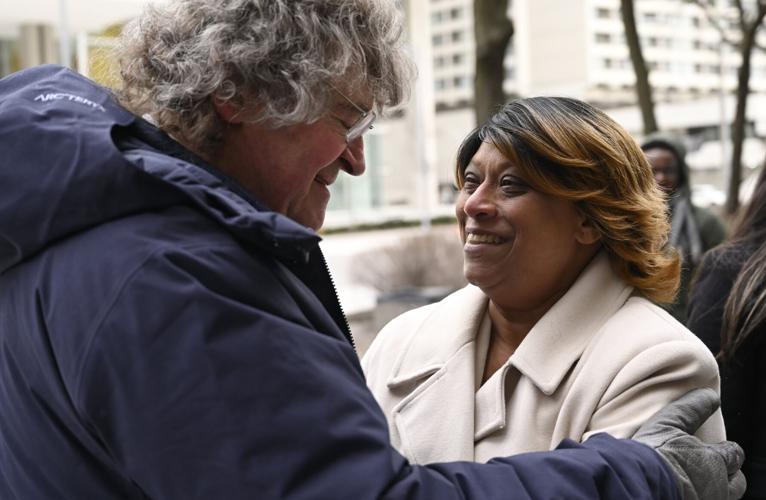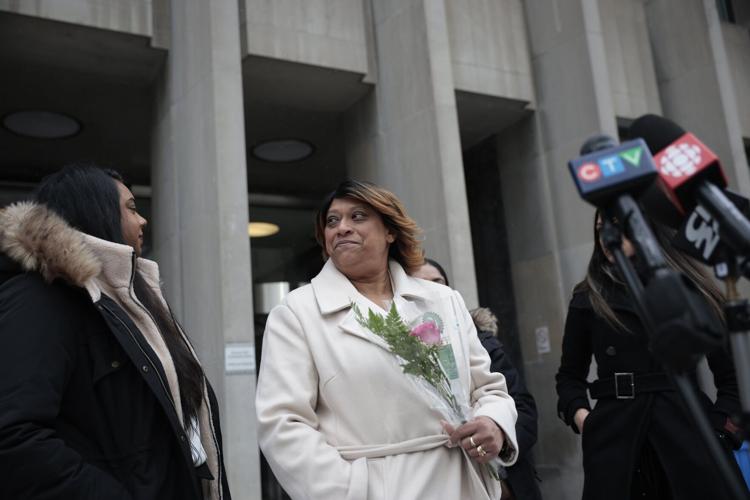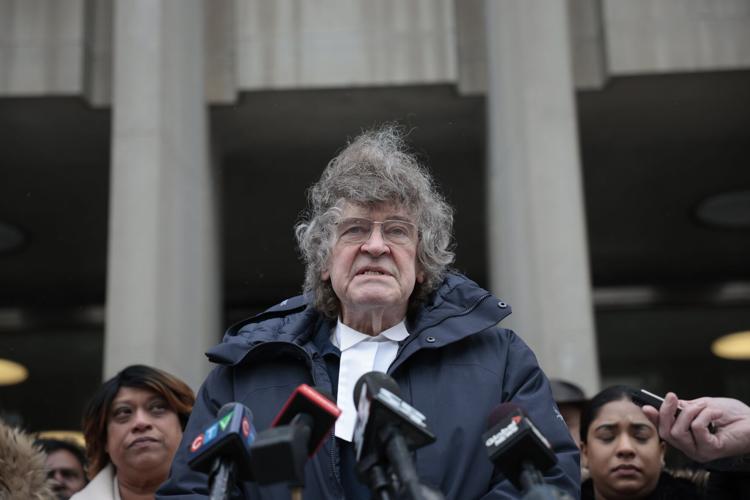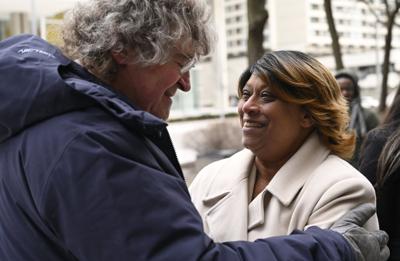The City of ╬┌č╗┤½├Į and the ╬┌č╗┤½├Į Police Service Board are denying allegations of negligence and false imprisonment set out in a lawsuit by Scarborough mother Cindy Ali filed in August 2024, months after she was acquitted of murder in her disabled daughterŌĆÖs death.
The lawsuit, seeking a total of $10 million in damages, alleges ╬┌č╗┤½├Į police had no grounds to charge Cindy in the 2011 death of 16-year-old Cynara Ali. Cynara, who lived with cerebral palsy, was found lifeless in the familyŌĆÖs Scarborough townhouse in February 2011.
Cindy served more than four years in federal custody after being convicted of first-degree murder in CynaraŌĆÖs death in 2016.
For more than a decade now, Cindy and her husband Allan Ali have maintained their daughter was killed as a result of a home invasion, but that police were quick to brush off their theory and soon shifted the target of the investigation to their family.
In a statement of defence filed in March, lawyers for the city and police board denied the AliŌĆÖs claims, doubling down on an original theory that Cindy fabricated evidence and lied to detectives during the yearlong investigation into CynaraŌĆÖs death.
The civil claims have not been tested in court.┬Ā
╬┌č╗┤½├Į mom Cindy Ali spent four years imprisoned before her conviction was quashed. In a new
Cynara’s death
On Feb. 19, 2011, Cindy called 911 to report that two masked men, one armed with a handgun, had just broken into her townhouse in Scarborough.
One of the men, Cindy later told police, grabbed her by the arm and forced her from room-to-room in search of a ŌĆ£package.ŌĆØ The other, she said, stayed with Cynara in the living room.
When Cindy returned to the living room, Cynara was lifeless on the couch. One of the men, she later testified, was standing nearby, holding a pillow.
The invaders then claimed theyŌĆÖd gotten the wrong house and fled out the basement door, Cindy said.
She managed to call police. ŌĆ£My baby,ŌĆØ she told 911 dispatchers. ŌĆ£SheŌĆÖs not breathing.ŌĆØ
╬┌č╗┤½├Į firefighter Semahj Bujokas was the first responder to arrive at the home. From the outset, Cindy claims Bujokas cast suspicion on her report of a home invasion due to his insistence that there was enough snow outside the home that footprints should have been present.
ŌĆ£There are no footprints, donŌĆÖt bullsŌĆö me,ŌĆØ the firefighter can be heard saying in a recording of her 911 call, played in court.┬Ā
Bujokas briefly resuscitated Cynara. She died 36 hours later at the Hospital For Sick Children; a cause of death was inconclusive.
The initial investigation
The police investigation into Cynara’s death worked quickly to discredit Cindy’s account of a home invasion, the claim alleges.
In the first two weeks after Cynara’s death,┬Āpolice had obtained CynaraŌĆÖs health records, the familyŌĆÖs immigration file and had authorized surveillance at the home of their extended family.
From that point on, court records suggest almost no efforts were made by detectives to probe the possibility of a home invasion.

Cynara Ali is fed by a family member in a photo made part of the court exhibits at Cindy Ali’s trial.
Court exhibitThe lawsuit also alleges police were behind one of the enduring mysteries of the case.
On March 16, 2011, Allan told detectives he found a letter in the familyŌĆÖs mailbox, written in the voice of the alleged home invaders explaining they had broken in under the instruction of a ŌĆ£bossŌĆØ but ŌĆ£got the wrong house.ŌĆØ
For more than a decade, the origin and author of the letter have been unknown.
At trial, prosecutors alleged it had been written by someone within the Ali camp, while the Ali’s lawsuit alleges it was planted by police, presumably to discredit them.
Project Litoria
After months of little movement in the investigation, detectives received court approval to intercept the communications of more than 20 people in or connected to the Ali family, track the familyŌĆÖs mobile devices and vehicles, and install a number of probes in their home.
In order to gain covert access to the familyŌĆÖs home and vehicle, undercover officers set up what the statement of claim describes as ŌĆ£a fictitious kioskŌĆØ at Scarborough Town Centre and offered Cindy and Allan’s then-15-year-old daughter the opportunity to enter a simulated raffle for an all-expenses-paid trip to Niagara Falls.
In his testimony, Allan said he was initially hesitant to allow his daughter to accept the offer, but that heŌĆÖd spoken to who he thought was a mall employer ŌĆö later discovered to be an undercover officer ŌĆö who assured him the sweepstakes were authentic. When the family embarked on the trip, police took the opportunity to enter their home and install probes.
It wasnŌĆÖt until nearly a decade later that the Alis realized the nature of the trip when it was confirmed at trial.
In March 2012, police arrived at the Ali home with an arrest warrant. Cindy was initially charged with manslaughter. Eight months later, the charge was┬Ā upgraded to first-degree murder citing investigatorsŌĆÖ belief that she lied about the home invasion and fabricated the letter.
A conviction appealed
At Cindy’s first trial, four years after her arrest, the Crown suggested Cindy had smothered Cynara after she’d become a burden on the family, staging a break-in as a coverup.┬Ā
A jury deliberated for less than 10 hours before convicting her of first-degree murder, handing her a life sentence with no chance of parole
Cindy spent just over four years in prison before her conviction was quashed in 2021 as part of an appeal launched by defence lawyers James Lockyer and Jessica Zita.
They successfully argued CindyŌĆÖs jury had been ŌĆ£straitjacketedŌĆØ into a decision that wrongly resulted in her conviction and life sentence. Not put to the jury were a number of possible theories, including that Cindy panicked while Cynara suffered a seizure, failed to administer sufficient assistance, and made up the home invasion to explain her daughter’s death.
CindyŌĆÖs conviction was quashed and she was granted a new trial, presided over by a judge alone in October 2023.
At the retrial, prosecutors argued a new motive ŌĆö that a series of seizures suffered by Cynara in the days before her death had caused Cindy to fear that her daughter’s quality of life was worsening. It was with this in mind, they alleged, that Cindy staged the townhouse to look like a home invasion had taken place before smothering Cynara in an act of mercy.
Again, Cindy denied the allegations and reiterated that she loved her daughter deeply and cared for her to the best of her ability.
On Jan. 19, 2024 ŌĆö more than a decade after Cynara was found without vital signs in her Scarborough townhouse ŌĆö Cindy was acquitted of murder after her retrial left Superior Court Justice Jane Kelly ŌĆ£in a state of uncertaintyŌĆØ about ŌĆ£the truth of the matter.ŌĆØ The decision sparked cries of relief from dozens of supporters present in the courtroom on the day.
The Crown did not appeal the acquittal.
City, police deny allegations┬Ā
To date, Cindy claims she bears scars of psychological and emotional trauma following her decade-long prosecution. While incarcerated, twice she tried to take her own life. The experience has left her unable to grieve CynaraŌĆÖs passing, she wrote in the claim.
The City of ╬┌č╗┤½├Į and police board deny responsibility for the consequences of their investigation and the resulting prosecution, however.
In their statement of defence, lawyers for the city doubled down on the theory that Cindy fabricated the letter and lied to police, ultimately obstructing their investigation. The defendants, which include the lead detective on the case, Frank Skubic, and firefighter Bujokas, have asked the court to dismiss the lawsuit with costs.
When reached by the Star, lawyers and representatives for the City of ╬┌č╗┤½├Į and the ╬┌č╗┤½├Į Police Service Board declined further comment while the matter was before the courts.
Skubic did not respond to requests for comment beginning in October and as recently as July. The now-retired detective has never spoken publicly about the case. Bujokas, currently on leave from his role as a fire captain, ŌĆ£emphaticallyŌĆØ denied any malice or misconduct on his part in a text message to the Star, calling the lawsuit “worthless.”
Cindy’s lawyers, Lockyer, Zita, and civil counsel Jeffery Hartman, have requested the matter be tried in ╬┌č╗┤½├Į.


































To join the conversation set a first and last name in your user profile.
Sign in or register for free to join the Conversation